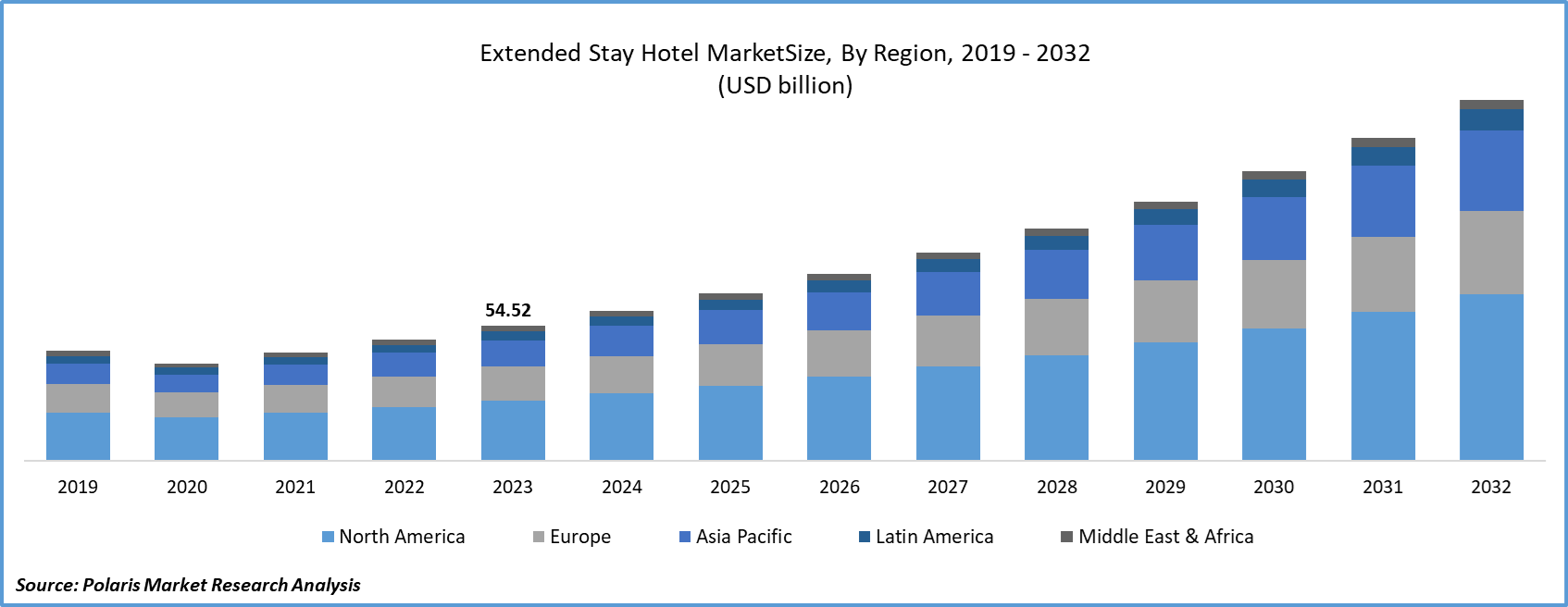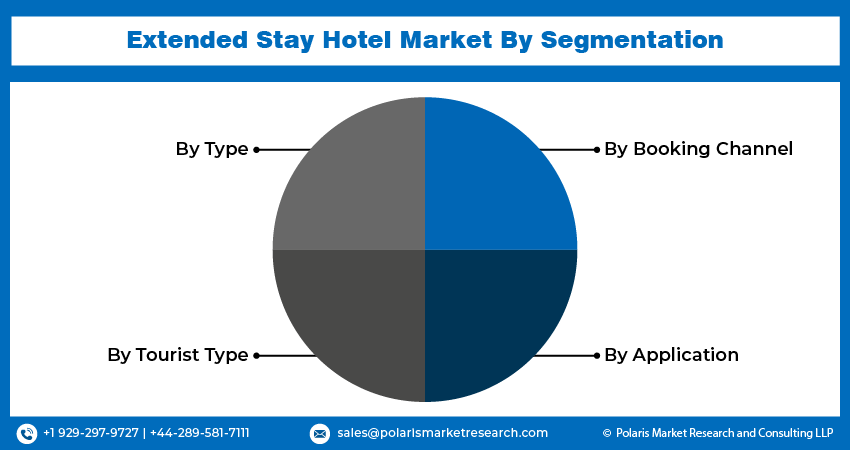
Extended Stay Hotel Market Size, Share, Trends, Industry Analysis Report: By Type (Economy, Mid-Range, and Luxury/Upscale), By Tourist Type, By Booking Channel, By Application and By Region (North America, Europe, Asia Pacific, Latin America, and Middle East & Africa) – Market Forecast, 2024–2032
- Published Date:Aug-2024
- Pages: 117
- Format: PDF
- Report ID: PM5038
- Base Year: 2023
- Historical Data: 2019-2022
Report Outlook
The global extended stay hotel market size was valued at USD 54.52 billion in 2023. The market is projected to grow from USD 60.78 billion in 2024 to USD 146.04 billion by 2032, exhibiting a CAGR of 11.6% during Forecast period.
The extended stay hotel market refers to the segment of the hospitality industry that provides accommodations specifically designed for guests who require lodging for an extended period, typically ranging from a week to several months. The global extended stay hotel market growth is attributed to the rising demand for flexible lodging solutions, increasing business travel and long-term stays among business professionals, and the rising preference of digital nomads for cost-effective and home-like accommodations. Additionally, the market is benefitting from a surge in relocations and temporary work assignments that fuel the need for extended stay options. Trends such as the incorporation of modern amenities, enhanced experiences of customers, and the integration of technology in booking and management systems are expected to propel market expansion in the future. There is a rising shift toward more versatile and convenient lodging solutions, which cater to corporate and leisure travelers.

To Understand More About this Research:Request a Free Sample Report
Extended Stay Hotel Market Trends
Growth in Business Travel and Remote Work
Companies increasingly adopt flexible work arrangements and international assignments; thus, employees require accommodations that offer more than just a brief stay. Extended stay hotels, with their home-like amenities and extended service options, are perfectly suited to meet this demand. The extended stay hotel market is reporting a higher occupancy rate from business travelers who need to be on-site for longer periods or are working remotely in new locations. Due to this trend, hotels are enhancing their offerings with dedicated workspaces, high-speed internet, and other business-friendly amenities, making them a preferred choice for professionals. Therefore, a rise in business travel and remote work is expected to drive the extended stay hotel market growth in the coming years.
Increased Emphasis on Personalization and Comfort
Personalization and comfort have become essential features in the extended stay hotel market as guests seek more tailored experiences during their extended stays. Hotels are responding by providing customized services and amenities such as personalized welcome packages, flexible room layouts, and gourmet food options that cater to individual preferences. The rising emphasis on creating a home-like environment, complete with fully equipped kitchens and living spaces, is becoming pronounced. This trend reflects a broader consumer preference for a more personalized and comfortable lodging experience, and hotels are investing in technology and staff training to meet these expectations.
Integration of Technology and Smart Features
The integration of technology and smart features is reshaping the extended stay hotel market. Hotels are increasingly adopting digital solutions to enhance guest experiences and operational efficiency. Innovations such as mobile check-in/check-out, smart room controls, and digital concierge services are becoming standard. These technological advancements streamline the guest experience and contribute to operational cost savings and improved management. The focus on technology aligns with the growing consumer demand for convenience and connectivity, positioning extended stay hotels as modern and adaptable lodging options in a rapidly evolving market.

Extended Stay Hotel Market Segment Insights
Extended Stay Hotel Market – Type Insights
The global extended stay hotel market segmentation, based on type, includes economy, mid-range, and luxury/upscale. The economy segment dominates the market due to its broad appeal among budget-conscious travelers and its significant presence in urban and suburban areas. This segment benefits from high occupancy rates as it caters to cost-effective long-term stays for business and leisure travelers. However, the mid-range segment is the fastest-growing category, driven by an increasing demand for a balance between affordability and enhanced amenities. The segment attracts travelers seeking comfort and premium facilities at a moderate cost.
The luxury/upscale segment holds the smallest market share and is experiencing steady growth, particularly in high-demand urban centers and popular tourist destinations. This growth is fueled by an increase in affluent travelers and extended stays related to high-profile business assignments or relocations.
Extended Stay Hotel Market – Tourist Type Insights
The global extended stay hotel market segmentation, based on tourist type, includes domestic and international travelers. The domestic segment dominates the market, driven by the high volume of local business trips, relocations, and long-term vacations. Domestic travelers benefit from convenience and cost savings associated with extended stays within their country, contributing to the steady demand for these accommodations. The domestic tourism segment remains robust due to its consistent need for budget-friendly and comfortable lodging solutions for extended periods.
The international segment is emerging as the highest-growing category due to a surge in global mobility and cross-border business activities. Increased international business assignments, relocations, and tourism contribute to this growth, with extended stay hotels offering a preferred option for foreign travelers seeking a home-like environment during their stay. The expansion of international travel and a rise in global workforces drive the demand for extended stay options that cater to international guests, which propels the market growth for the segment.
Extended Stay Hotel Market – Booking Channel Insights
The market segmentation by booking channel highlights distinct trends in consumer preferences. The online segment dominates the market, driven by the convenience and efficiency of digital platforms. The rise of mobile applications uses and online travel agencies, travelers increasingly prefer to book extended stays which offer easy comparison of options and instant confirmations. This dominance is supported by the growing trend of digitalization and the high level of internet accessibility, making online bookings the most prevalent choice among consumers.
The on-phone segment is experiencing the highest growth rate. As customer service and personalized assistance become more valued, travelers seeking tailored recommendations and support are turning to phone bookings. This trend is particularly noticeable among older demographics and those with specific needs or preferences that are better addressed through direct communication. The rise in phone bookings reflects a broader demand for personalized service and direct interaction, positioning it as a rapidly expanding channel within the extended stay market.
Extended Stay Hotel Market – Application Insights
In the extended stay hotel market, the segmentation by application reveals distinct patterns between travelers, business customers, and other categories. The business customers segment dominates the market, driven by the need for long-term accommodations related to project assignments, relocations, and corporate travel. Extended stay hotels cater to this segment by offering amenities tailored to business needs, such as workspaces, high-speed internet, and meeting facilities. This dominance reflects the stable and predictable demand from business clients who require reliable and comfortable lodging for extended periods.
The travelers segment is witnessing the highest growth rate, which includes leisure and long-term vacationers. As more individuals opt for extended vacations or prolonged stays in different locations, the demand for extended stay options grows. This trend is supported by an increasing preference for immersive travel experiences and the flexibility to explore new destinations over longer periods. The shift in consumer preferences toward flexible and extended travel arrangements fuels the market growth for the travelers segment.
Extended Stay Hotel Market, Segmental Coverage, 2019 - 2032 (USD billion)

Source: Secondary Research, Primary Research, PMR Database and Analyst Review
Extended Stay Hotel Market Regional Insights
By region, the study provides market insights into North America, Europe, Asia Pacific, Latin America, and the Middle East & Africa. The North America extended stay hotel market accounted for the largest market share in 2023, driven by its well-established infrastructure, high levels of business travel, and significant demand for long-term accommodations. The region benefits from a robust economy, a high concentration of multinational corporations, and a strong trend toward flexible working arrangements, which fuels the need for extended stay options. Additionally, North America’s advanced technological adoption and the prevalence of online booking platforms further support the market growth. While other regions such as Europe and Asia Pacific are expanding due to increasing business activities and evolving travel preferences, North America's established market presence and consistent demand for extended stay accommodations solidify its position as the leading region.
The extended stay hotel market in Europe is experiencing steady growth, driven by increasing trend of business travel, rising relocations, and a growing trend toward long-term leisure stays. Major metropolitan areas such as London, Paris, and Berlin are key hubs, attracting corporate clients and leisure travelers seeking extended accommodations. The region benefits from a well-developed infrastructure and a diverse array of options catering to various budgets. The European market is also seeing growth in demand for eco-friendly and sustainable accommodations, reflecting broader regional trends toward environmental consciousness. However, economic uncertainties and fluctuating travel regulations can adversely impact market stability.
Extended Stay Hotel Market Regional Coverage, 2019 - 2032 (USD billion)

Source: Secondary Research, Primary Research, PMR Database and Analyst Review
The Asia Pacific extended stay hotel market is witnessing rapid growth owing to expanding business activities and increasing international travel. Key markets such as China, India, and Australia are driving this growth due to their booming economies, rising urbanization, and a growing expatriate population. The demand for extended stay options is particularly high in major business districts and emerging cities such as shanghai, and others . The region's rapid economic development and burgeoning middle-class population contribute to a rising appetite for flexible and long-term lodging solutions. Additionally, improvements in infrastructure and increased investments in the hospitality sector are supporting the market expansion.
Extended Stay Hotel Market – Key Market Players and Competitive Insights
Key players in the extended stay hotel market are major global and regional chains that dominate the sector with a wide range of offerings. Prominent players include Marriott International with its Residence Inn and TownePlace Suites brands, Hilton Worldwide with Homewood Suites and Home2 Suites, and InterContinental Hotels Group (IHG) with its Staybridge Suites and Candlewood Suites brands. Other significant players are Hyatt Hotels Corporation with Hyatt House, Extended Stay America, and The Ascott Limited with its Ascott The Residence brand. Additionally, brands such as Country Inn & Suites by Radisson, Element by Westin, and Staycity Aparthotels contribute to the competitive landscape. Regional chains such as Mantra Group in Australia and Louvre Hotels Group in Europe also play a significant role.
Insights reveal that innovation and customer experience are crucial competitive factors in the extended stay hotel market. Leading players are increasingly investing in technology to streamline booking processes, enhance in-room experiences, and offer personalized services. There is also a notable trend toward sustainability and eco-friendly practices, which resonates with environmentally conscious travelers. Companies that effectively adopt technological advancements to offer personalized and sustainable offerings are likely to gain a competitive edge and capture a larger share of the expanding market.
Marriott International is a global player in the extended stay hotel Industry, known for its prominent brands such as Residence Inn and TownePlace Suites. The company leverages its extensive global network and strong brand reputation to cater to business and leisure travelers seeking long-term accommodations. Marriott’s emphasis on modern amenities and high standards of service enhances its appeal in the extended stay segment.
Extended Stay America is another major player in the market, specializing exclusively in extended stay accommodations. The company operates a vast number of properties across the US, offering tailored services and amenities designed for long-term guests. Its focus on affordability and flexibility has made it a popular choice among business travelers and relocating families.
Key Companies in Extended Stay Hotel Market
- Marriott International (Residence Inn, TownePlace Suites)
- Hilton Worldwide (Homewood Suites, Home2 Suites)
- InterContinental Hotels Group (IHG) (Staybridge Suites, Candlewood Suites)
- Hyatt Hotels Corporation (Hyatt House)
- Extended Stay America
- The Ascott Limited (Ascott The Residence)
- Country Inn & Suites by Radisson
- Element by Westin
- Staycity Aparthotels
- Mantra Group
- Louvre Hotels Group
- Oakwood Worldwide
- Fraser Hospitality
- Adina Apartment Hotels
- Quest Apartment Hotels
Extended Stay Hotel Industry Developments
- In August 2024, Extended Stay America planned to open several new properties in key metropolitan areas across the US, reflecting its commitment to expanding its presence and meeting the growing demand for extended stay options.
- In June 2024, Marriott International announced the opening of a new Residence Inn in Toronto, Canada, expanding its footprint in the key North American market.
Extended Stay Hotel Market Segmentation
Extended Stay Hotel – Type Outlook
- Economy
- Mid-Range
- Luxury/Upscale
Extended Stay Hotel – Tourist Type Outlook
- Domestic
- International
Extended Stay Hotel – Booking Channel Outlook
- Online
- On-Phone
- In-Person
Extended Stay Hotel – Application Outlook
- Travelers
- Business Customers
- Others
Extended Stay Hotel – Regional Outlook
- North America
- US
- Canada
- Europe
- Germany
- France
- UK
- Italy
- Spain
- Netherlands
- Russia
- Rest of Europe
- Asia Pacific
- China
- Japan
- India
- Malaysia
- South Korea
- Indonesia
- Australia
- Vietnam
- Rest of Asia Pacific
- Middle East & Africa
- Saudi Arabia
- UAE
- Israel
- South Africa
- Rest of Middle East & Africa
- Latin America
- Mexico
- Brazil
- Argentina
- Rest of Latin America
Extended Stay Hotel Report Scope
|
Report Attributes |
Details |
|
Market size value in 2023 |
USD 54.52 billion |
|
Market size value in 2024 |
USD 60.78 billion |
|
Revenue forecast in 2032 |
USD 146.04 billion |
|
CAGR |
11.6% from 2024 to 2032 |
|
Base year |
2023 |
|
Historical data |
2019–2022 |
|
Forecast period |
2024–2032 |
|
Quantitative units |
Revenue in USD billion and CAGR from 2024 to 2032 |
|
Report coverage |
Revenue Forecast, Market Competitive Landscape, Growth Factors, and Trends |
|
Segments covered |
|
|
Regional scope |
|
|
Competitive landscape |
|
|
Report format |
|
|
Customization |
Report customization as per your requirements with respect to countries, regions, and segmentation. |
How is the report valuable for an organization?
Workflow/Innovation Strategy: The extended stay hotel market has been broadly segmented on the basis of type, tourist type, booking channel, and application. Moreover, the study provides the reader with a detailed understanding of the different segments at the global and regional levels.
Growth/Marketing Strategy: In the extended stay hotel market, growth and marketing strategies are increasingly focused on enhancing customer experiences and leveraging technology. A few strategies include expanding property portfolios in high-demand urban and suburban areas, investing in digital marketing to attract tech-savvy travelers, and offering personalized services to cater to diverse customer needs. Brands are emphasizing sustainability and eco-friendly practices to appeal to environmentally conscious guests. Additionally, strategic partnerships and loyalty programs are being used to build customer retention and attract repeat businesses. These approaches help brands differentiate themselves in a competitive market and drive sustained business growth.
FAQ's
The global market size was valued at USD 54.52 billion in 2023 and is projected to grow to USD 146.04 billion by 2032.
The global market is projected to record a CAGR of 11.6% during 2024–2032.
North America accounted for the largest market share due to its well-established infrastructure, high levels of business travel, and significant demand for long-term accommodations.
A few prominent players operating in the market are Marriott International with its Residence Inn and TownePlace Suites brands, Hilton Worldwide with Homewood Suites and Home2 Suites, and InterContinental Hotels Group (IHG) with its Staybridge Suites and Candlewood Suites brands.
The economy segment dominated the market in 2023 due to its broad appeal among budget-conscious travelers and its significant presence in urban and suburban areas.
The domestic segment accounted for a larger market share due to the high volume of local business trips, relocations, and long-term vacations
An extended stay hotel is a type of lodging designed for guests who need accommodations for an extended period, typically one week or longer. Unlike traditional hotels that cater to short-term stays, extended stay hotels offer amenities that support long-term living such as fully equipped kitchens, spacious living areas, and laundry facilities. They are often used by business travelers on temporary assignments, relocating individuals, and families in transition.
Following are a few key trends observed in this market: Increased Demand for Flexibility: Growing preference for flexible lodging solutions due to the rise in remote work and long-term business assignments. Enhanced Personalization: Focus on tailored experiences and customized services to meet the specific needs of guests. Technological Integration: Adoption of digital tools for booking, check-in/check-out, and smart room controls to enhance guest convenience. Sustainability and Eco-Friendly Practices: Implementation of green initiatives and sustainable practices to attract environmentally conscious travelers.
A new company entering the extended stay hotel market must focus on integrating advanced technology to streamline operations and enhance guest experiences to stay ahead of the competition. Investing in smart room features, digital booking systems, and personalized services can significantly differentiate the brand. Emphasizing sustainability through eco-friendly practices and energy-efficient amenities will attract environmentally conscious travelers. Additionally, targeting emerging markets with high growth potential, such as Asia Pacific and Latin America, and offering flexible pricing and loyalty programs can capture a diverse customer base and build long-term brand loyalty.
Companies owning hotels and related services and other consulting firms must buy the report.
